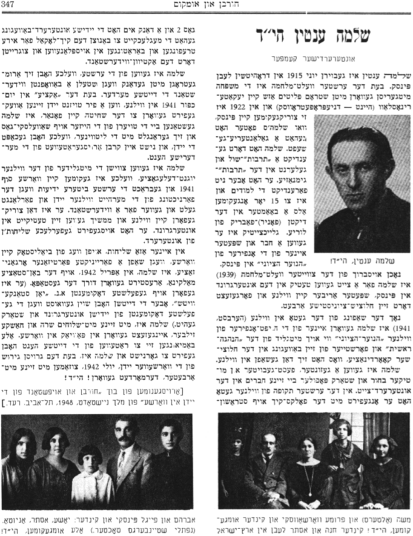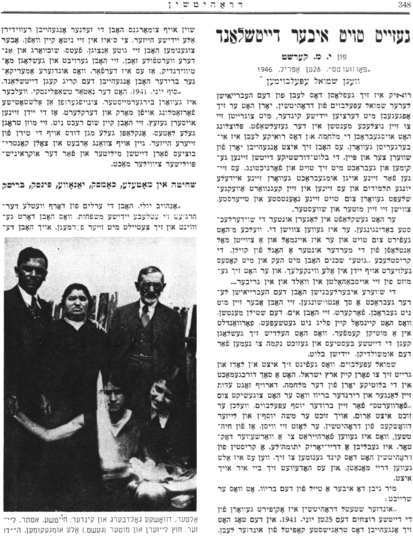
[Page 347]
Shlomo Entin, May G-d avenge his blood!
Underground fighter
[photo:] Shlomo Entin
Shlomo Entin was born in Drohitchin in 1915. During World War I his family joined the stream of refugees going to Yekaterinoslav (today known as Dneprpetrovsk), and in 1922 returned to Pinsk, where Shlomo's father had a haberdashery shop. Shlomo graduated from the Tarbut school and studied at the Tarbut high school. However, he did not complete his studies, and at 15 he was employed as a clerk at Luria's veneer factory. He was also a member and later one of the leaders of the Noar Hatzioni [Zionist Youth] in Pinsk.
Following the outbreak of World War II in 1939, Shlomo was active for a time in the underground in Pinsk. Later on he moved to Vilna and continued his Zionist pioneer work. After the Vilna ghettos was set up in the autumn of 1941, Shlomo became one of the main leaders of the Vilna Noar Hatzioni, as well as a member of the Haganah Reshit [Head Haganah]. He represented his movement in the Zionist pioneer organization that existed in Vilna. Shlomo was a healthy, well-built and courageous young man, and was very popular among his friends during the time of the Underground. During the early period of the Vilna ghetto, he operated the public kitchen at 2 Strashun Street, and thanks to him the Jewish underground movement was able to use the kitchen for its meetings and preparing its plans for an uprising.
Shlomo was one of the first people to think of undertaking an armed resistance against the German murderers. During the aktsia on Yom Kippur 1941 in Vilna, when some four thousand Jews were taken away to be killed at Fonar, Shlomo stood by the doors of the houses on Shavelsky Street and wrestled with the Lithuanians who were taking the Jews. He was able to save several victims from the hands of the murderers.
Shlomo was among the members of the Vilna youth delegation in Warsaw at the end of 1941, bringing the earliest reports about the destruction of the majority of Vilna Jews. He asked for money and weapons for an uprising. He returned to Vilna and continued his activities with the Underground.
In one of this missions, on the way to Warsaw from Byalistock to form a united partisan organization, Shlomo was arrested in April 1942 by the Gestapo at the Maklina train station (he was traveling with false documents under the name of Jan Stankevicz), but the Germans already knew about the false documents of the Jewish underground, and were very cautious. Together with his colleagues Sarah and Khashka Zilber, Shlomo was imprisoned in Warsaw, and no amount of effort to save him from the hands of the Germans was of any use. During the transfer of the Jews of Warsaw in July 1942, Shlomo was murdered together with his colleagues. May G-d avenge his blood!
(From the book, Destruction and Uprising of the Jews in Warsaw by Melech Neistadt, 1948, Tel Aviv. Editor)
[right photo:] Moshe (Alters) and Fruma Warshavsky and children perished. May G-d avenge their blood! The children Chana and Esther live in Israel.
[left photo:] Avraham and Feigel Pinsky and children: Yosha, Esther, Anyuta (Naftali Steinberg's daughter). May G-d avenge their blood!

[Page 348]
DEATH ACROSS GERMANY
By Y. M. Kerst
Forverts, April 28, 1946
Regarding Shmuel Eppelbaum
Life for Drohitchin Hebrew teacher Shmuel Eppelbaum proceeded normally. For years he was dedicated to educating Jewish children and to preparing them to becoming contributing members of society. Suddenly the war broke out, and his normal life was turned upside down, and several years of suffering and torment would now begin. The bloodthirsty Germans arrived and brought with them death and destruction. Shmuel saw his own fine young students being killed, and saw his loved ones and neighbors, including his own mother and sister being carried away to be killed.
Shmuel slaved away to camps under the most dreadful conditions. He was among those who were taken away to be killed, but more than once he was able to escape from the murderers under a hail of bullets. The “good” Christian neighbors lay in waiting with scythes and axes in every nook and cranny. Shmuel had to hide from them in the forest and in ditches.
The difficult experiences brought the Hebrew teacher many disappointments, but did not break his courage. On the contrary, they transformed this quiet man, who could never hurt a fly, into a courageous fighter who fought bravely against the German beasts, and who sought revenge for the innocent Jewish blood.
Shmuel Eppelbaum, who now lives in Lodz and is preparing to move to Palestine. He underwent a great deal during the bloody war years. His long and moving letter to the Forverts that he sent in his search for his brother Yosef Eppelbaum attests to this. He is also searching for Moshe Yosef and Leizer Dvoshkas from Drohitchin. He wants them to know that Chayatcha left behind a three year-old orphan, a child that she had had with her husband, a Warsaw doctor. A Christian in Drohitchin took in this child at the age of three months, and the child is still living there.
Here is a part of his letter:
“The German murderers occupied our town of Drohitchin on June 25, 1941. That day was the beginning of the most tragic chapter of our lives. The very next morning the soldiers started checking every Jewish home for weapons. However, instead they took good items such as shortening, shoes and other valuable items. They robbed and pillaged, claiming that it was because our American brethren had started the war against Germany.
“At the end of June, 1941, the notary Chaplinski, who became mayor, called together a town meeting in the market, and declared that the Jews were no longer under the law, that they had no rights, and that they had to wear yellow patches, hang yellow Stars of David on their doors, participate in forced labor and pay taxes to the German army and Ukrainian civilian authorities.
[photo:] Alter and Dvoshka Goldberg and children: Chaytcha, Esther, Leizer. Apart from Leizer and their late mother, the rest perished. May G-d avenge their blood!
Massacres in Motele, Khomsk, Yanova, Pinks and Brisk
“At the beginning of July, the gentiles in the village of Vetla killed the few Jewish families that had lived there, and distributed their property amongst themselves. The
Previous Page |
Next Page
JewishGen, Inc. makes no representations regarding the accuracy of
the translation. The reader may wish to refer to the original material
for verification.
JewishGen is not responsible for inaccuracies or omissions in the original work and cannot rewrite or edit the text to correct inaccuracies and/or omissions.
Our mission is to produce a translation of the original work and we cannot verify the accuracy of statements or alter facts cited.
 Drogichin, Belarus
Drogichin, Belarus
 Yizkor Book Project
Yizkor Book Project
 JewishGen Home Page
JewishGen Home Page
Copyright © 1999-2025 by JewishGen, Inc.
Updated 4 Dec 2001 by LA